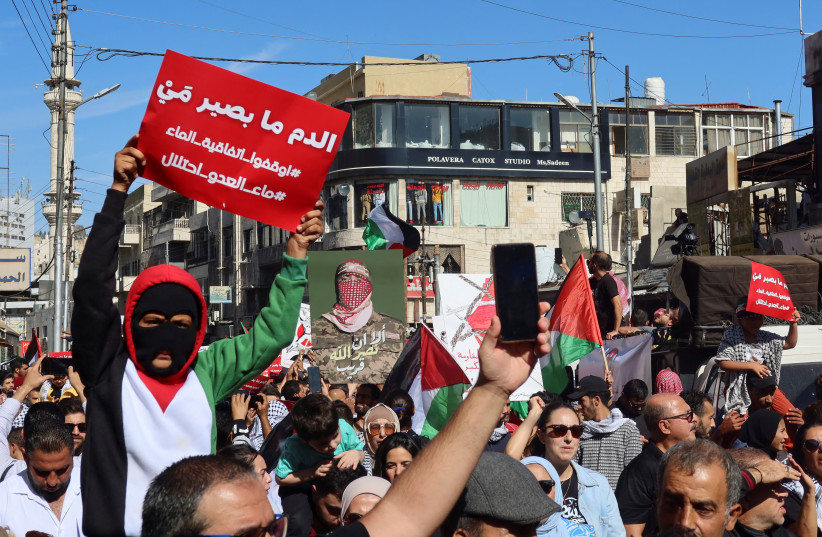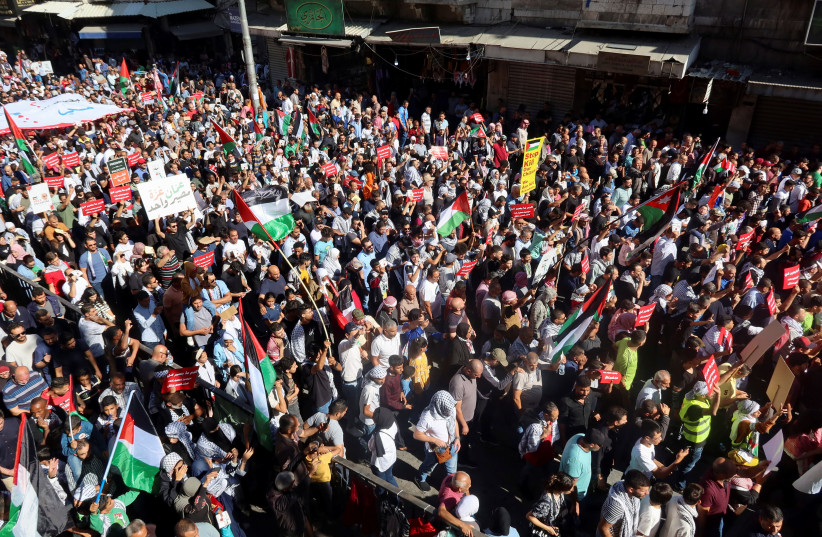Prime Minister Bisher Khaswaneh, reflecting growing regional tensions, says any Israeli attempt to relocate Palestinians is as an act of war.
DAOUD KUTTAB/THE MEDIA LINE NOVEMBER 17, 2023 07:05

Demonstrators carry flags and banners during a protest in support of Palestinians in Gaza, amid the ongoing conflict between Israel and the Palestinian Islamist group Hamas, in Amman, Jordan November 10, 2023.
The prime minister of Jordan, Bisher Khasawneh, has broken his silence to deliver a blistering message to the Israelis. Khaswaneh said that any Israeli effort to physically attempt to relocate Palestinians from the West Bank, in any form, would be considered an act of war. Addressing members of the parliament, Khaswaneh said that there might be further diplomatic moves to the decision to withdraw the Jordanian ambassador and to deny the reentry of the Israeli ambassador if the war doesn’t end.
Muath Momani, executive director of the Law & Society Institute, told The Media Line that Jordan’s position in support of the Palestinian cause was and remains consistent and clear: “It is certain that Jordan, through its positions in support of the Palestinian cause, has some fears of the forced displacement of Palestinians from their lands. The Jordanian prime minister recently stated that if that happens, then it is war. Jordan will not hesitate to protect the Palestinian people from practices that affect their existence and identity.”
Samar Muhareb, director of the Arab Renaissance Democracy and Development organization, believes that Jordanian officials have been reflecting public sentiment. “The statements of the prime minister and the foreign minister are aimed at breaking the deadlock that has been going on for a month,” she told the Media Line.
Muhareb put the issue in terms of the national interests of Jordan. “The occupiers need to understand the interests of the region, and especially Jordan.” She argued convincingly for an immediate cease-fire and an eventual end to the Israeli occupation while also addressing the Palestinian refugee issue. Muhareb insists that this “is not only a form of solidarity—[but also] what happens in Palestine is an integral part of Jordanian national interest and a source of our country’s stability.”

Jordan in Palestinians
Ahmad Awad, director of the Amman-based Phenix Center for Economic and Informatics Studies, told The Media Line that the Jordanian position has been clear since the war on Gaza began. “Jordan is not only a neighboring country but is a country that has direct relations with Palestinians and is therefore affected socially [and] economically whenever changes take place in Palestine.”
Awad, who is also a member of the Himam coalition of civil society organizations in Jordan, warned of the danger of any effort at resettling Palestinians in Jordan. “This is a real threat because the far right-wing Israeli government has talked about this, and some Israeli decision-makers are even saying this is a chance to empty the West Bank and Gaza from Palestinians. Therefore, Jordan had to respond to this danger.” Awad says there are many options in dealing with this unprecedented Israeli crime in Gaza.
For Jordan, however, agreements with Israel provide badly needed water. The Jordanian monarch, King Abdullah, has succeeded in securing a €900 million grant mainly for the Jordan water carrier project. The project aims to carry water desalinated in the Red Sea to the urban areas in the center of the kingdom.
The war on Gaza is causing major political upheaval in Jordan as the country is witnessing daily demonstrations, protests, boycotts of various Western products, and an unprecedented unity of the society. Jordanians are united behind the need for an immediate cease-fire and Jordan officials have noted that they worry that with the war on Gaza continuing, radicalization is being felt at all levels.
Nevertheless, Tagreed Odeh, a political analyst, argued that Jordanian diplomacy is still taking balanced steps toward what is happening in Gaza. “What the prime minister said is nothing but a reminder to the Israeli side of the content of the peace treaty, which makes any forced displacement a break in the commitments of the peace treaty. Violating the treaty certainly means moving from the stage of peace to a declaration of war.”
Odeh said that Jordan is practicing politics in a wise way that ensures “the safety of Jordan in the first place, and then stability in its position toward the Palestinian issue.”
While there is no sign that we will soon see the cancellation of the Jordan-Israel peace agreement, there is no doubt that the pressure is building up on the government and the palace to do just that.
Jordan is reluctant to give up on its peace deal with Israel; it has both security and social implications, including the issue of water which Jordan badly needs.
Faisal Al Fayez, president of the Jordanian Senate, has said that the issue of the Jordanian-Israel peace agreement is an Arab decision. The Arab League convened an emergency summit in the Saudi capital Riyadh on November 11 but did not release a public statement on the matter due to a lack of consensus among Arab states on the nature of a joint response.
Content retrieved from: https://www.jpost.com/israel-news/article-773708.